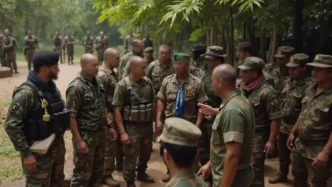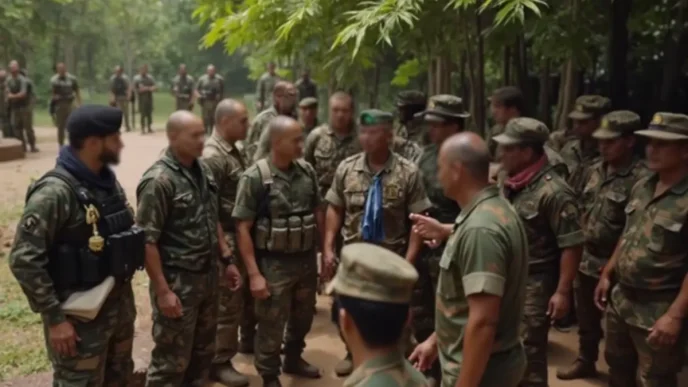A controversial revision to Indonesia’s military law, passed unanimously by the House of Representatives on Thursday, has reignited concerns about the creeping influence of the armed forces in civilian affairs. The amendment to the 2004 TNI Law, which governs the role of the Indonesian National Armed Forces (TNI), expands the military’s reach into civilian institutions and non-war operations, prompting critics to warn of a potential return to the authoritarian past of the New Order era under President Soeharto.
The revision, enacted with little public consultation, comes under the administration of President Prabowo Subianto, a former Army general who assumed office in October 2024. While Prabowo pledged to uphold civilian supremacy during his campaign, his government’s early actions—including the placement of active military officers in civilian roles and the direct involvement of soldiers in flagship policy programs—have raised questions about his commitment to democratic principles.
A Step Back to Militarism?
The revised TNI Law increases the number of civilian institutions where active military officers can hold positions from 10 to 14, particularly in sectors tied to security and defense. Additionally, the law broadens the scope of the TNI’s non-war operations from 14 to 16 areas, now including cybersecurity and the protection of national interests and citizens abroad. Critics argue that these changes pave the way for greater military interference in civilian governance, echoing the infamous dwifungsi (dual function) doctrine of the New Order era, which allowed the military to dominate both security and political spheres.
“This revision is a dangerous step toward militarization” warned a prominent human rights advocate in Jakarta, speaking on condition of anonymity due to fear of reprisal. The lack of transparency in the legislative process has further fueled concerns, with the bill notably absent from the National Legislation Program priority list for 2025.
Historically, Indonesia’s democratic reforms following the fall of Soeharto in 1998 sought to confine the military to a professional, defense-focused role, stripping it of political influence. The 2004 TNI Law was a cornerstone of these reforms, limiting the military’s involvement in civilian affairs. However, the recent amendments, which focus on just three articles, have been criticized for undermining these hard-won gains. While TNI officials have publicly stated that there is no intention to revive dwifungsi, skeptics remain unconvinced, pointing to the gradual expansion of military roles under both Prabowo and his predecessor, Joko “Jokowi” Widodo.
Prabowo’s Vision: Security or Control?
Since taking office, President Prabowo has integrated military personnel into key civilian initiatives, including his signature free nutritious meals program and food self-sufficiency policies. Reports indicate that 200 colonels have been enrolled in management and business courses to prepare for assignments in state-owned enterprises, a move that blurs the lines between military and civilian domains. This direct involvement has led to speculation that Prabowo, leveraging his military background, may be prioritizing security and control over democratic norms.
Political analysts note that Prabowo’s administration operates in a context of weak opposition and limited checks and balances, creating fertile ground for unchecked military expansion. “If these trends continue, we could see a silent erosion of civilian authority” said Dr. Lina Hartono, a political scientist at the University of Indonesia. She emphasized that while the immediate reinstatement of dwifungsi appears unlikely, the gradual nature of these changes poses a long-term threat to Indonesia’s democracy, often dubbed the world’s third-largest.
The timing of the law’s passage, just months into Prabowo’s presidency, has also drawn scrutiny. Some observers suggest that the haste and lack of public input reflect a deliberate strategy to avoid debate on a deeply divisive issue. If confirmed, this could signal a broader intent to centralize power, though no concrete evidence supports claims of a premeditated rollback of democratic reforms at this stage.
Historical Echoes and Generational Divides
For older Indonesians who lived through the New Order regime, the military’s brutal suppression of dissent and pervasive control over civilian life remain vivid memories. The post-1998 reforms, known as Reformasi, were a direct response to these abuses, aiming to transform the TNI into a professional force subordinate to civilian oversight. Yet, younger generations, particularly members of Gen Z who have no direct experience of military rule, may be less attuned to the warning signs of creeping militarism.
“Many young people see Prabowo as a grandfatherly figure, the ‘gemoy’ persona he cultivated during the campaign” noted Sari Wijaya, a Jakarta-based sociologist. This perception, she argued, could dull public resistance to policies that expand military influence, especially among those unfamiliar with the violent crackdowns on university campuses and political opposition during Soeharto’s rule.
Civil society groups have called for renewed efforts to educate the public on the importance of maintaining civilian supremacy. They argue that democracy’s defenders must remain vigilant, reminding both policymakers and citizens of the need to strengthen democratic institutions and prevent a return to the “dark past” of authoritarianism.
A Missed Opportunity for Modernization
Beyond concerns about militarization, critics contend that the TNI Law revision missed an opportunity to address more pressing needs. With the geopolitical landscape evolving rapidly and technological advancements like drones and artificial intelligence reshaping modern warfare, many had hoped the law would focus on developing a new doctrine for military conflict suited to the 21st century. Instead, the amendments prioritize expanding the TNI’s civilian footprint, a move that some military analysts describe as shortsighted.
“The focus should have been on preparing the TNI for emerging threats, not on placing soldiers in boardrooms” said retired Colonel Bambang Susilo, who now consults on defense policy. He cautioned that without a forward-looking approach, Indonesia risks falling behind regional peers in military modernization, even as it grapples with internal debates over the armed forces’ role.
Regional and International Implications
Indonesia’s domestic policies often reverberate across Southeast Asia, where the balance between military and civilian power remains a sensitive issue in several nations. Neighboring countries like Thailand and Myanmar have their own histories of military dominance, and any perceived backslide in Indonesia could embolden similar tendencies elsewhere in the region. Internationally, Indonesia’s status as a democratic success story has been a point of pride, and any erosion of civilian rule may impact its standing among global partners.
While no official statements have been issued by foreign governments at the time of writing, posts on X from regional commentators suggest growing unease. Many express concern that Indonesia’s trajectory could influence broader democratic norms in ASEAN, though such sentiments remain speculative and unverified by official sources.
The Road Ahead
As Indonesia navigates this contentious chapter, the revised TNI Law stands as a test of President Prabowo Subianto’s commitment to democracy. Public reaction remains mixed, with some viewing the changes as pragmatic measures to bolster national security, while others see them as a dangerous overreach. Civil society organizations have vowed to challenge the law through advocacy and public campaigns, insisting that the fight to preserve civilian rule is far from over.
For now, the nation watches closely, grappling with the question of whether these amendments mark a temporary shift or the beginning of a deeper transformation. As reforms unfold, the balance between security and democracy hangs in a delicate equilibrium, with the lessons of history looming large over Indonesia’s future.














